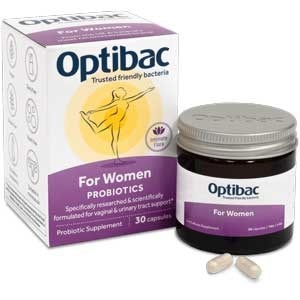Supplements for women: which do you really need?
When it comes to choosing a supplement, it can be a bit of a minefield with so many different ones to choose from. Lots of people, understandably, don’t know where to start, so this article looks at the key nutrients including vitamins, minerals and probiotics that women need to support both their hormonal and reproductive needs, along with the best nutrients to support beautiful skin, hair and nails.
Women have a very different set of nutritional needs to men when it comes to hormonal health, as in general there is a lot more that can go wrong for women. Once a man has been through puberty, they have a relatively steady stream of hormones for the rest of their lives. Women, on the other hand, are often at the mercy of a roller-coaster of hormonal changes each month.
Alongside the nutrients mentioned below, it is important for women to follow a diet that assists in balancing hormone levels. In general, this means adopting the following principles:
- Avoiding simple sugars and refined carbohydrates, only consuming carbohydrates that have a low glycaemic load
- Avoiding stimulants such as caffeine, alcohol and cigarettes
- Eating plenty of essential fats in the form of cold-pressed seed oils, avocados, nuts, seeds and oily fish
- Increasing soluble fibre
- Consuming foods that supply us with phyto-oestrogens (such as lentils, chickpeas and linseeds and sesame seeds)
In my clinic I recommend that women of child-bearing age take a good all-round multi-vitamin and mineral supplement alongside an omega 3, 6 and 9 blend. This provides the foundation for their supplement programme. In addition to that, I then recommend specific, targeted nutrients dependent on their individual needs and symptoms.
I have listed some of the most common health conditions that I see in my clinic, when it comes to female health.
PMS
PMS is thought to affect between 70-90% of women at some point in their lives. The list of symptoms can vary greatly from woman to woman, but may include: bloating, tender breasts, irritability, fatigue, anxiety, headaches and mood swings. Very little is understood about the precise cause of the symptoms, however it is thought to be an imbalance of the main female reproductive hormones, oestrogen and progesterone.

The most important nutrients to consider when it comes to PMS are: Vitamin B6, Vitamin E, zinc, magnesium and essential fats (especially GLA from borage oil, starflower oil and evening primrose oil), all of which help to balance hormone levels and address specific symptoms such as water retention.
Heavy periods (menorrhagia)
On average women lose 6-8 teaspoons of blood (roughly half an egg cup full) in each menstrual period. Anything much more than this, would be considered to be heavy bleeding. There can be many different causes for abnormally heavy bleeding, some of them serious, so this should always be checked by a GP. However, more often than not there will be no obvious gynaecological problem, in which case nutritional methods can work well to normalise the cycle and menstrual flow.
Excess levels of oestrogen could be the cause, as oestrogen is responsible for the building up of the endometrial lining prior to menstruation. If oestrogen levels are excessively high then the lining of the womb becomes too thick, and this leads to a very heavy menstrual flow.
The B-vitamins are the key family of nutrients to look at when it comes to heavy menstruation. These nutrients are needed by the liver to convert excess oestrogen in to weaker forms that result in less of a build up of the womb lining.
Anaemia
As a consequence of heavy menstruation, women are at far greater risk of becoming anaemic than are men. Anaemia can be tested for by your GP, by a simple blood test, that shows levels of iron in the blood and also levels of stored iron (or ferritin) in the body.
Anaemia can bring different symptoms, but things to look for include: Fatigue, constipation, low energy, pallor and loss of appetite. If blood tests show that your iron levels are low then supplemental iron for a period of a few months (or ongoing) will redress any imbalance. Certain forms of iron can exacerbate constipation in sensitive individuals, so if that is a problem for you then look for ferrous gluconate, or liquid iron supplements which are less likely to have this side-effect.
Vaginal infections
Infections of the urogenital tract are very common in women of all ages. Conditions such as bacterial vaginosis (BV), cystitis/urinary tract infections, and yeast infections take hold when the balance of normal, healthy vaginal flora is affected either due to medications (such as antibiotics and the birth control pill), stress, the use of soap-based products or poor diet. A lack of Lactobacilli bacteria in the vagina alters the pH making it less acidic than it should be. Under these conditions pathogenic (undesirable) bacteria and yeasts are able to flourish.

The vaginal flora is directly affected by the GI flora. It has been proven in clinical trials that certain strains of Lactobacilli pass through the entire digestive system alive, and then cross from the anus (via the perineum) to populate the vagina and urogenital tract. In this way we can positively influence the levels of beneficial bacteria in the female urogenital tract and help support womens intimate health, reducing the risk of infections such as bacterial vaginosis (BV), thrush, and cystitis/UTIs. Two strains in particular have shown superior capabilities with regards to adhesion to the vaginal epithelia and effective inhibition of uro-pathogens, and these strains are: Lactobacillus reuteri RC-14® and Lactobacillus rhamnosus GR-1® . These two strains have been clinically trialled in women for decades, looking specifically at their ability to support intimate health.
These strains can be found in Optibac Probiotics For Women. Follow this link to read more about the best probiotics for women's health.
Healthcare professionals can visit the Probiotics Database to read more about the research into Lactobacillus reuteri RC-14® and Lactobacillus rhamnosus GR-1® .
Beautiful skin, hair and nails
Health of the skin, hair and nails is dependent on good levels of minerals in the diet, especially zinc, magnesium, calcium, iron and silica. Due to the fact that minerals can be difficult to digest and absorb, not only must we be consuming them on a regular basis, but we also need strong digestion so that we can assimilate them. For this reason, I often recommend a supplement of digestive enzymes alongside a multi-mineral formula for anyone complaining of poor skin, nail or hair health. For smoother hair and lustrous skin then an omega 3,6,9 blend is also a great investment!
There are of course many many more conditions that affect women, including PCOS, endometriosis, ovarian fibroids, irregular menstruation etc. All of these conditions respond well to a hormone balancing diet, alongside targeted nutritional supplements, so I would always recommend consulting a qualified nutritional therapist or naturopath for advice if you suffer from any of these conditions.
References
- G.Reid, R.L.Cook, A.W.Bruce, Examination of strains of Lactobacilli for properties which may influence bacterial interference in the urinary tract, J.Urol.138 (1987) 330-335
- G.Reid, Probiotic agents to protect the urogenital tract against infection, Am.J.Clin Nutrition 73 (2001) 437S-443S
Popular Articles
View all Women's Health articles-
Women's Health12 Jan 2024
-
Women's Health02 Feb 2024



